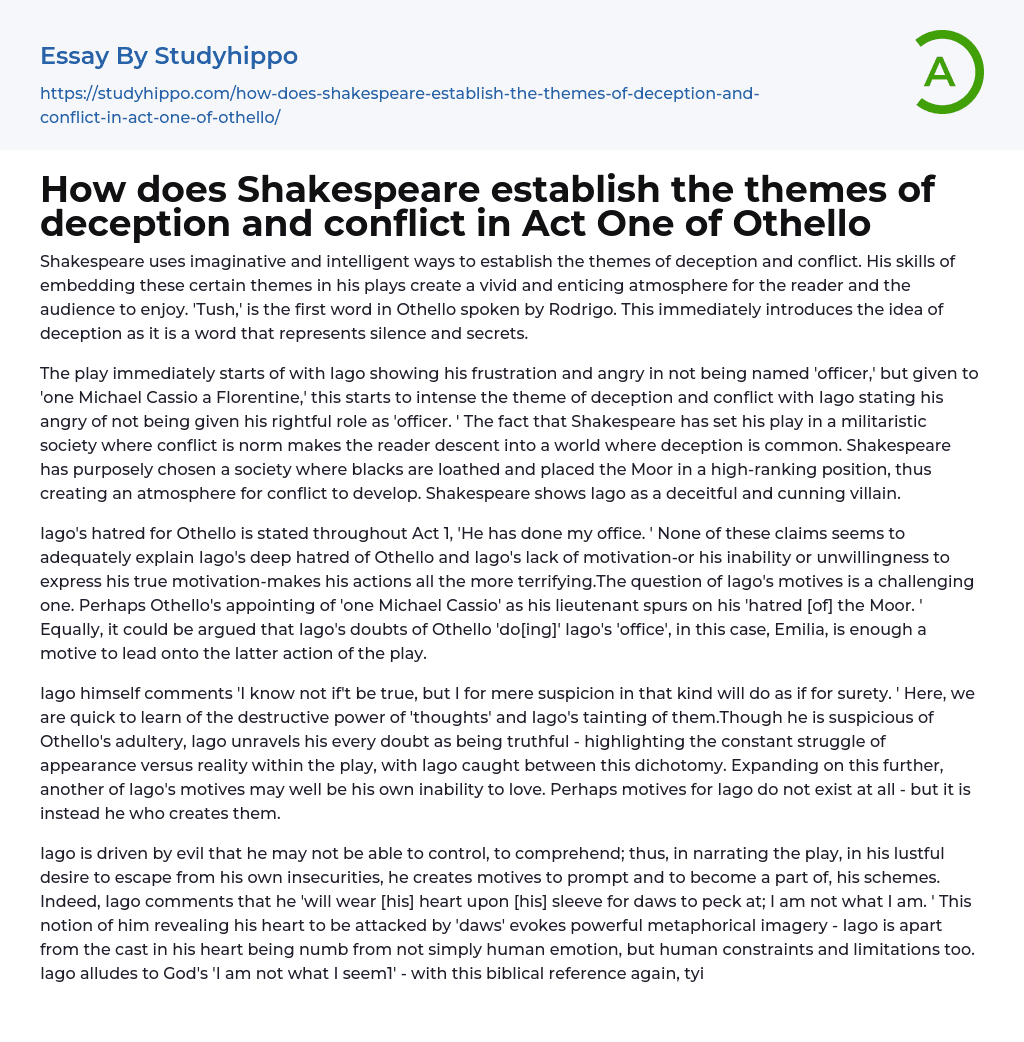Shakespeare uses imaginative and intelligent ways to establish the themes of deception and conflict. His skills of embedding these certain themes in his plays create a vivid and enticing atmosphere for the reader and the audience to enjoy. 'Tush,' is the first word in Othello spoken by Rodrigo. This immediately introduces the idea of deception as it is a word that represents silence and secrets.
The play immediately starts of with Iago showing his frustration and angry in not being named 'officer,' but given to 'one Michael Cassio a Florentine,' this starts to intense the theme of deception and conflict with Iago stating his angry of not being given his rightful role as 'officer. ' The fact that Shakespeare has set his play in a militaristic society where conflict is norm makes the reader descent into a world where deception is c
...ommon. Shakespeare has purposely chosen a society where blacks are loathed and placed the Moor in a high-ranking position, thus creating an atmosphere for conflict to develop. Shakespeare shows Iago as a deceitful and cunning villain.
Iago's hatred for Othello is stated throughout Act 1, 'He has done my office. ' None of these claims seems to adequately explain Iago's deep hatred of Othello and Iago's lack of motivation-or his inability or unwillingness to express his true motivation-makes his actions all the more terrifying.The question of Iago's motives is a challenging one. Perhaps Othello's appointing of 'one Michael Cassio' as his lieutenant spurs on his 'hatred [of] the Moor. ' Equally, it could be argued that Iago's doubts of Othello 'do[ing]' Iago's 'office', in this case, Emilia, is enough a motive to lead onto the latte
action of the play.
Iago himself comments 'I know not if't be true, but I for mere suspicion in that kind will do as if for surety. ' Here, we are quick to learn of the destructive power of 'thoughts' and Iago's tainting of them.Though he is suspicious of Othello's adultery, Iago unravels his every doubt as being truthful - highlighting the constant struggle of appearance versus reality within the play, with Iago caught between this dichotomy. Expanding on this further, another of Iago's motives may well be his own inability to love. Perhaps motives for Iago do not exist at all - but it is instead he who creates them.
Iago is driven by evil that he may not be able to control, to comprehend; thus, in narrating the play, in his lustful desire to escape from his own insecurities, he creates motives to prompt and to become a part of, his schemes. Indeed, Iago comments that he 'will wear [his] heart upon [his] sleeve for daws to peck at; I am not what I am. ' This notion of him revealing his heart to be attacked by 'daws' evokes powerful metaphorical imagery - Iago is apart from the cast in his heart being numb from not simply human emotion, but human constraints and limitations too. Iago alludes to God's 'I am not what I seem1' - with this biblical reference again, tying into this concept of appearance versus reality; truth versus deceit. Biblical connotations run throughout the play, Iago talks of how 'our bodies are gardens', perhaps denoting the Garden of Eden; we also later learn 'that with the little godliness' Iago has, he 'did
full hard forbear' Roderigo.
Here, Iago declares: 'hell and night Must bring this monstrous birth to the world's light. ' The hellish, derogatory imagery that his lexis exudes is all too prevalent here; he himself sets up the opposition between 'night' and 'light', with the contrast and antitheses that Iago brings to Othello being portrayed as 'monstrous'.
His diction is markedly reductive and evocative throughout the play. Indeed, he cries: 'an old black ram is tupping your white ewe'; with his speech here littered with enjambment, evoking this sense of flow, embodying perhaps the concept of him being able to connect all of his ideas and merge them into this river of uninterrupted thought that literally, and symbolically, breaks up Brabantio's lamenting with frequent dashes and caesura, disrupting the pentameter, forcing his thoughts to become disjointed and thus enabling Iago to penetrate through this broken narrative and thought and effectively manipulate Brabantio's will to his own advantage.
- Othello Jealousy essays
- Adult essays
- Aggression essays
- Altruism essays
- Archetype essays
- Behavior essays
- Certainty essays
- Conformity essays
- Deception essays
- Human Behavior essays
- Human Sexuality essays
- Maturity essays
- Morality essays
- Obedience essays
- Procrastination essays
- Reinforcement essays
- Role Model essays
- A Doll's House essays
- A Midsummer Night's Dream essays
- A raisin in the sun essays
- A Streetcar Named Desire essays
- An Inspector Calls essays
- Death of a salesman essays
- Everyman essays
- Fences essays
- Hamlet essays
- Hedda Gabler essays
- Iago essays
- King Lear essays
- Macbeth essays
- Much ado about nothing essays
- Oedipus Rex essays
- Oedipus The King essays
- Othello essays
- Pygmalion essays
- Romeo And Juliet essays
- Tartuffe essays
- The glass menagerie essays
- The Importance of Being Earnest essays
- The Merchant Of Venice essays
- The Taming of The Shrew essays
- Twelfth Night essays
- Waiting For Godot essays
- Aldous Huxley essays
- Alice Walker essays
- Amy tan essays
- Anne Bradstreet essays
- Anton Chekhov essays
- Arthur Miller essays
- Augustine essays




